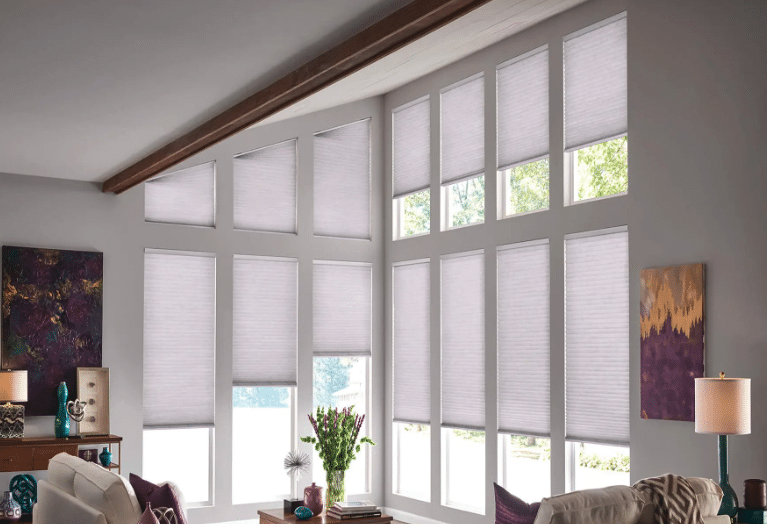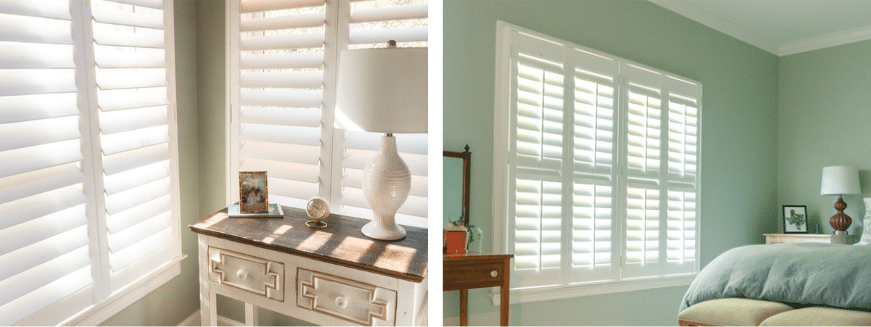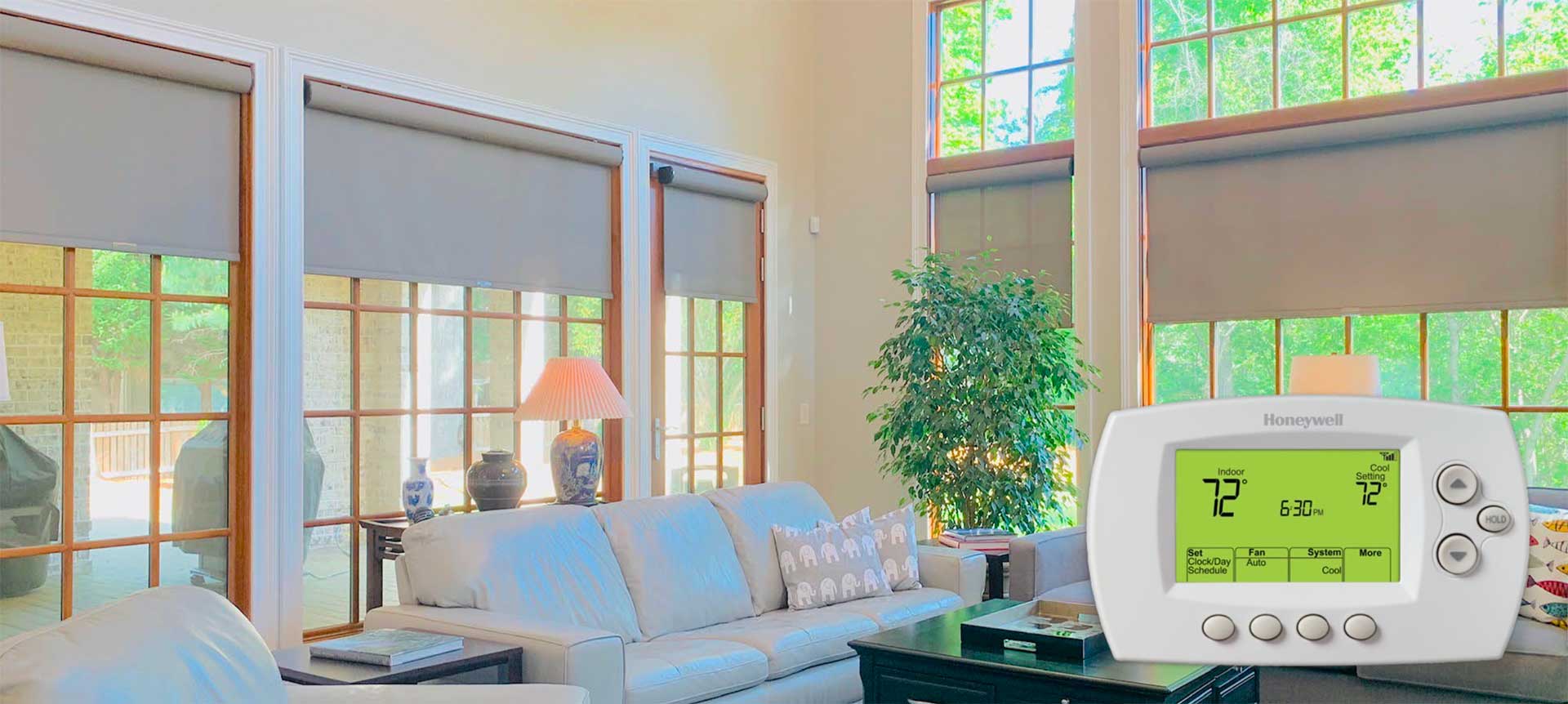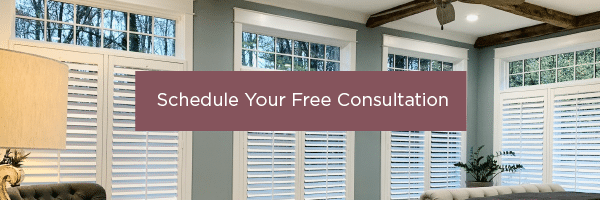Windows treatments can play a crucial role in improving energy efficiency and creating a comfortable indoor environment. By strategically selecting shutters and shades, we can significantly reduce heating and cooling expenses throughout the year. Shutters and shades can help lower your energy bills, but to get the most out of your window treatments, it’s important to consider factors such as the time of day, window orientation, and the unique climate of the Southeast.
Understanding Energy-Efficient Window Treatments
Energy-efficient window treatments can help to minimize heat gain during hot summers and heat loss during chilly winters. Shutters and shades act as a barrier, preventing outdoor temperatures from affecting your indoor climate.
Shutters offer exceptional versatility and style, making them an ideal choice for homeowners in the Southeast. They provide excellent insulation, reducing heat gain in summer and heat loss in winter. Additionally, shutters allow for precise control of natural light and privacy, enabling you to optimize your indoor environment.
Shades are another valuable option for controlling the amount of sunlight entering your home. By strategically adjusting shades throughout the day, you can harness natural light while preventing excessive heat gain. During the hot summer months, cellular or honeycomb shades with insulating properties can prove especially effective in reducing cooling costs.

Insulated cellular shades provide a strong combination of thermal performance, privacy, daylighting, glare control, and view.
The Importance of Energy-Efficient Window Treatments
Choosing the right window treatments can significantly impact the energy consumption in your home. Shutters and shades can function as insulators, preventing unwanted heat gain during the hot summer months and minimizing heat loss in winter. By properly managing heat transfer, these window treatments help maintain a comfortable temperature indoors while reducing the workload on your HVAC system. Installing shutters can effectively block intense sunlight and reduce solar heat gain, while also allowing you to enjoy natural ventilation and maintaining privacy. Adjustable shutters allow you to control the amount of light entering your home, creating a cool and shaded environment within your home.
The Impact of Window Orientation
The direction your windows face has a significant impact on heat gain and loss, and understanding this factor can guide your decision-making when selecting window treatments. Southeastern summers can be scorching, especially during peak daytime hours. Here are some tips on treatment selection based on your windows’ orientation:
South-Facing Windows: Windows facing south are exposed to direct sunlight throughout the day. For these windows, consider installing plantation shutters made from insulating materials. These shutters provide excellent light control and insulation, keeping your home cooler in summer and warmer in winter. South and west-facing windows receive the most sunlight during the day, so using shutters or shades with light-blocking features will help reduce heat gain.

Plantation shutters are a great option to help control the sunlight coming through your south and east facing windows.
East and West-Facing Windows: Windows facing east and west experience direct sunlight during the morning and evening, respectively. For these windows, consider installing roller shades or Roman shades with reflective or light-colored fabrics. These shades can help reflect sunlight away and reduce solar heat gain.

Roman shades are made of heavier fabrics and typically come with a liner that work together to hold heat in during the winter and block it out in the summer.
North-Facing Windows: Windows facing north typically receive the least amount of direct sunlight and may not require as much heat-blocking treatment. Nevertheless, it’s still essential to consider insulation for these windows. Plantation shutters made from energy-efficient materials can help reduce heat loss during colder months and provide an extra layer of insulation.
The Importance of Seasonal Adjustments
As the seasons change, so should your window treatments. Here are some seasonal considerations to make when choosing your window treatments:
Summer: In the Southeast, where summers are hot and humid, it is crucial to focus on heat reduction, and shutters and shades play a vital role in reducing cooling costs. By utilizing shutters or shades with reflective or light-colored materials, you can deflect the sun’s rays and keep your interior cool. Shutters with adjustable louvers or solar shades can also help block excess sunlight and prevent heat buildup, which allows you to maintain a comfortable indoor temperature while reducing reliance on air conditioning.
Winter: In cooler months, it’s important to minimize heat loss through windows. Energy-efficient shutters and shades can help create a barrier to prevent cold drafts, therefore reducing the workload on your heating system. By retaining heat, these window treatments ensure a warm interior while saving on heating costs. During the winter, you can adjust your treatments to maximize sunlight and warmth retention, which will help further reduce your heating costs.
Window treatments are a particularly valuable investment for Southeastern homeowners seeking to lower their heating and cooling costs while maintaining a comfortable indoor environment. By carefully selecting shutters and shades, considering factors such as window orientation and seasonal variations, you can achieve optimal energy efficiency while also creating a comfortable living space. By investing in energy-efficient window treatments, you’ll not only save money but also contribute to a greener, more sustainable future for your home and the environment.
Acadia Shutters’ range of products is designed to cater to the unique climate of the Southeast, offering both style and functionality. Explore our collection today and start saving on your energy bills while enhancing your home’s aesthetic appeal.

